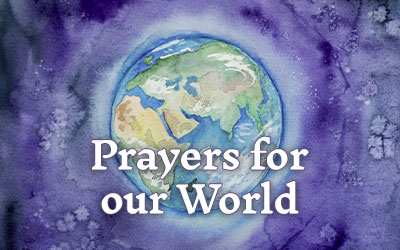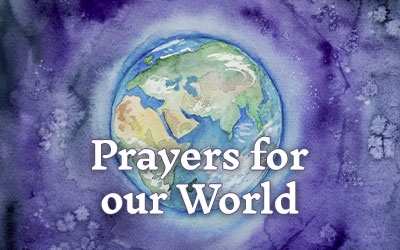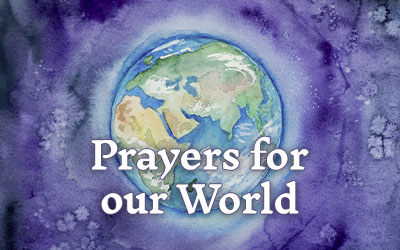Fighting resumed last week in northern Ethiopia’s Tigray region, ending a month’s long cease-fire and burying hopes for a peaceful resolution of the country’s civil war.
The conflict began nearly two years ago and has pitted Ethiopian Prime Minister Abiy Ahmed’s federal government against the region’s rulers, the Tigray People’s Liberation Front (TPLF), which Addis Ababa has since designated a terrorist organization. So far, as many as half a million Ethiopians have died, and more than 1.6 million people have been displaced.
“Respect for this truce over the past five months has saved countless lives,” U.S. Secretary of State Antony Blinken said in response to the renewed hostilities, which began last Wednesday. He warned that “a return to active conflict would result in widespread suffering, human rights abuses, and further economic hardships.”
Both the Ethiopian government and the TPLF reported fighting between their forces but denied instigating the fighting—blaming the other party.
The Ethiopian Ministry of Defence said in a statement that its Air Force shot down a plane carrying weapons for Tigrayan rebels from neighbouring Sudan on Aug. 24. TPLF spokesperson Getachew Reda wrote in a tweet that the statement was “a blatant lie.”
Hostilities have escalated quickly since then. On Friday, UNICEF condemned an airstrike by the Ethiopian government that the organization said “hit a kindergarten, killing several children, and injuring others” in Mekelle, Tigray’s capital. Local medics say at least seven people were killed. International media cannot verify these numbers because the region remains inaccessible to journalists.
“Yet again, an escalation of violence in northern Ethiopia has caused children to pay the heaviest price,” UNICEF executive director Catherine Russell wrote in a tweet.
Meanwhile, the United Nations World Food Program (WFP) said Tigrayan authorities stole 570,000 litres of fuel from its warehouses in the region last Wednesday, jeopardizing humanitarian operations there. According to the United Nations, supplies of food, medicine, and fuel in Tigray are critically low. The organization says full-blown famine looms in Tigray as East Africa experiences its worst drought in 40 years.
“Millions will starve if we do not have fuel to deliver food,” WFP executive director David Beasley wrote in a tweet condemning the theft. Tigrayan authorities hit back with a statement claiming they had loaned more than 600,000 litres of fuel to the WFP this year.
More: FP
Pray:
May your peace, that surpasses human understanding, be shed abroad in the hearts of all Ethiopians. (Philippians 4:6-7)
May your peace bring calm among the chaos that has unfolded in different communities throughout the nation of Ethiopia. (1 Corinthians 14:33)
God of peace, we pray too for love, kindness and compassion will lead to reconciliation and lasting peace. (Ephesians 4:32)
Lagos, Nigeria – On July 15, Reverend Fathers Donatus Cleophas and Mark Cheitnum were in the empty rectory of Christ the King parish in Yadin Garu, a town in the Southern Kaduna area of northwest Nigeria when five armed men walked in.
The gunmen confiscated the phones of both priests, who had stayed to celebrate mass after an ordination service in that diocese, and led them into the muddy grounds of a maize farm near the parish. There, Cheitnum was shot dead, and his body was left in the rain, while his colleague was taken away.
“We did not have any scuffle, nothing,” Cleophas, who has since regained his freedom, told Al Jazeera. “All I can think of is because maybe Father [Mark] was wearing canvas [shoes] and he could not keep up with the pace at which we were moving.”
According to the Armed Conflict Location and Event Data Project (ACLED), violence against Christians targeted on the basis of their religious identity has spiked, just as political violence against civilians has generally been on the rise too. Its data shows that attacks on Christians in the country increased by 21 percent in 2021 compared with 2020. On average, monthly attacks have also risen by over 25 percent in the last year.
In June, gunmen killed dozens at a Catholic church in Ondo, spotlighting a possibly religious undertone to the country’s insecurity. The state government blamed the ISIL-linked ISWAP (Islamic State in West Africa Province) for the incident, but the group is yet to claim responsibility.
Experts say attacks against the church are also increasingly targeting Christian leaders, as operations of armed groups nationwide assume dangerous dimensions. Indeed, between January 2020 and July 2022, there were 99 independent attacks against Nigerian clergy, ranging from abductions to outright murder, according to ACLED’s database which compiled records from local media reports.
“The data is a very vivid reflection of what is going on in our society [with regards to] the economic hardship and the booming kidnapping for ransom industry that we see today,” said Olajumoke Ayandele, a former ACLED researcher and currently a postdoctoral research fellow at New York University’s The Centre for the Study of Africa and the African Diaspora.
More: Aljazeera
Pray:
For the families of those who have lost loved ones to violence in Nigeria. (Psalm 34:18)
For the safety and security of Christian leaders in Nigeria. May they remain faithful in the protection of the Lord. (2 Thessalonians 3:3)
For the economic growth and development of Nigeria, that hardship may be overcome and replaced with growth and prosperity.
One year after the U.S. pull-out from Afghanistan, the situation inside the beleaguered nation is dire. Todd Nettleton, the spokesman for The Voice of the Martyrs (VOM), a persecution watchdog serving Christians across the globe, told CBN’s Faithwire about the tragic conditions on the ground.
“There’s a lot of hardship in Afghanistan,” Nettleton said, explaining that the Taliban, who retook power one year ago, know little about governance. “The economy is in shambles. The Taliban are fighters; they’re not governors. And now, for the last year, they’ve had to be the governors.”
As a result, he said the entire country is suffering. “There’s not enough food,” Nettleton said. “There’s not enough housing. There’s not enough fuel for heat. Everyone is suffering.”
“There are Christians still in Afghanistan. There are Christians in every province of Afghanistan,” Nettleton said. “Many Christians did flee a year ago with the Taliban takeover, especially those who were publicly known — those who maybe had worked with Western aid organizations or had somehow been kind of publicly identified as a follower of Christ.”
“Afghan Christians who were less well known, many of them made the incredibly bold decision to stay in Afghanistan,” Nettleton said. “They knew also what the Taliban’s theology was, they knew also what would happen if they were outed as Christians, but their attitude was, ‘Listen, if all the Christians leave the country, who’s still going to be here to share the Gospel?'”
These believers have faced considerable challenges over the past year. Nettleton shared the story of one man who had to move his family three times in the first eight months of Taliban rule. Once people started to ask questions, the family found it safer to skip to another location for safety’s sake.
While Christian persecution is nothing new in Afghanistan, it has reportedly intensified even further during Taliban rule. But Nettleton said persecution doesn’t only come at the hands of the Taliban. “There’s always been persecution of Christians in Afghanistan. It’s not just the Taliban that will persecute you for following Christ,” he said. “It might be your father. It might be your older brother who says, ‘Listen, we are a Muslim family. By following Jesus, you have brought shame on our family. The only way we can get rid of that shame is either to get you to come back to Islam or to punish you severely.””
While noting “the persecution of Christians is continuing unabated,” Release International, a U.K.-based group monitoring Christian persecution, marked the first anniversary of the U.S. pullout by reporting, “there are early signs that the Christian faith could be growing among Afghans despite — or because — of violent persecution.”
In January, Afghanistan was designated the worst nation in the world for Christian persecution, according to Open Doors USA. The shocking development was the “biggest seismic shift” in decades, as North Korea, the reclusive and oppressive East Asian country, was bumped from the top spot it had occupied for 20 years.
“This year’s 2022 World Watch List, we think, is the biggest seismic shift in over 20 years because Afghanistan is now the No. 1 country on the World Watch List, supplanting North Korea,” Open Doors USA CEO David Curry told CBN’s Faithwire.
More: CBN News, Faithwire, Open Doors
Pray:
That secret believers in Afghanistan will not let fear of the Taliban dictate how they live. (Matthew 5:10-12)
That God will strengthen their faith as they do their best to survive under new leaders and in the midst of an unstable economy.
Lift all Afghan girls and women up to the Lord today. Pray that opportunities to grow and thrive would not be snatched away from them. (Psalm 68:5)
This September 25th - October 5th, hundreds of locations around the world will be gathering together for 10 Days of night and day prayer, fasting, worship, and repentance. We invite you to join with the global church as together we lift up our voice to our God, crying out "Maranatha", come Lord Jesus.
Please watch this vision video. Could it be that God is calling us back to the Upper Room, the place where the Church was born, but this time as a Global Church?
The Church was born in a 10 Day prayer meeting. Could it be that God is calling us back to where it all began, but this time as a Global Church?
Register Your City for 10 Days
Is your city, town, or region planning a 10 Days Event? Let us know what's happening using this city-registration form. Once we confirm the event, we'll add you to the growing list of locations organizing their own 10 Days event this September 25-October 5th. *Even if you registered a previous year, please do a new registration for 2022.
The Challenge is a personal commitment to enter into a season of fasting, prayer, and repentance. Sign-up Today and join with believers around the globe in this season of Consecration.
We are excited to continue our GO PRAY 1st Friday, 'Praying for the Harvest' with key prayer ministries from around the world.
We will meet together on October 7th, 6:00am - 7:00am (pacific) to pray together with Teaching and worship, led by Dr Jason Hubbard (IPC).
Then from 7:00am - 8:00am we will pray for India / South Asia: 24/7 prayer and Breakthrough of the Gospel!
As always, our primary prayer focus is that Jesus Christ will be exalted, honored, and treasured in the nations!
May He be 'revealed' that He might be 'revered.' May He have the Supremacy and Pre-eminence in all things, Col. 1:18 ... He is Worthy!
GO PRAY - 1st FRIDAY – October 7th 2022
6AM (PACIFIC) | 1PM (UTC) | 8PM (WIB)
More info and Join us at www.gopray.world
54 Days of Prayer for Africa – 26 Sept – 18 November.
A prayer initiative by the South African Christian Leadership Initiative (SACLI), toward the healing of Africa from the wounds caused by slavery, colonialism, exploitation and racism.
We invite Africa and the nations of the world to pray with us from 26 September to 18 November 2022.
‘Finally, brothers and sisters, rejoice! Strive for full restoration, encourage one another, be of one mind, live in peace. And the God of love and peace will be with you.’ 2 Cor 13:11 (NIV)
Click here for the Prayer Booklet | Download Flier
More info: Anneke Rabe
Email: This email address is being protected from spambots. You need JavaScript enabled to view it.
Introducing the vision and events for Trumpets to Tabernacles 2022!
EXALTING | PROCLAIMING | JESUS
This year, global movements of prayer and mission are partnering once again in Trumpets to Tabernacles, a collaboration of events, missions and initiatives with a theme inspired by the fall Biblical feasts of Trumpets, Atonement, and Tabernacles.
We see this special time-period as a God-ordained, Scripturally based season to seek God with both repentance and humility (Trumpets, Atonement) and also with celebration and anticipation (Tabernacles).
As we gathered this year from around the world, a clear desire emerged from our hearts to return to the simplicity of knowing Jesus, the crucified Lamb who is now seated at the right-hand of the Father in heaven, possessing all power and authority. If only somehow this year we could come to know Him better, to see Him as He really is, and to exult Him together with believers from every nation. If only we could rightly declare His glory among the nations and proclaim who He is to those who have never heard.
This is the cry of our heart this year—simply to know JESUS more. We hope you’ll join us in these days of fasting, repentance, and mourning—as well as in times of rejoicing, proclamation, and harvest!
Here are some of this year’s events:

AUG 27TH - Global Day of Hope - www.globaldayofhope.com
SEP 25 – OCT 5TH - 10 Days - www.10days.net
SEP 22 – 24TH - IHOPKC The Return - www.ihopkc.org/return
OCT 1ST - Redigging the Wells of Revival 2022 - www.wellsofrevival.us
OCT 3-7TH - Watchman's School of Prayer - www.jwipn.com/seminars-events
OCT 12-15TH - Awaken the Dawn - Nashville - http://awakenthedawn.com/atd-nashville/
OCT 4-6TH - GACX Forum - https://forum.gacx.io/
LOVE JAPAN is a network and movement of Japan churches that strongly hope and dream of changing Japan.
We believe that change begins with prayer. Through prayer, we can become one in Christ. That's where God's work begins!
Our Vision: Transformation – Unity – Revival – Next Generation – Seeing God’s Glory!
Our Invitation…
We invite you to join us by devoting 30 minutes a day or once each week to pray for Japan!
Sign up HERE and we will send you a weekly guide with lots of encouragements.
You will have access to the Echo Smartphone App with interactive tools and prayer reminder notifications.
‘My name will be great among the nations, from where the sun rises to where it sets.’ Mal 1:11
More info & Sign up: https://www.lovejapan.world/en/home-en/







